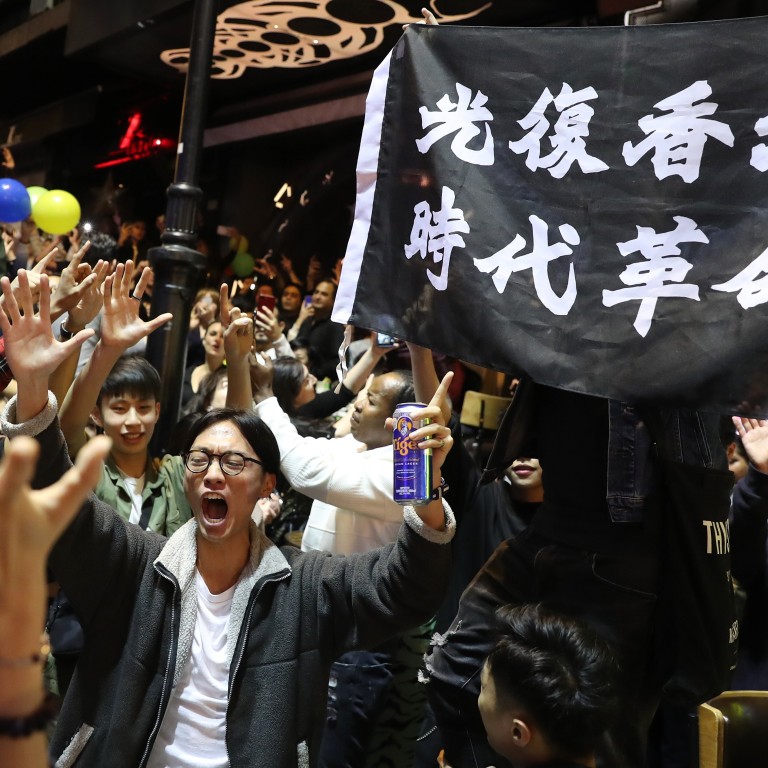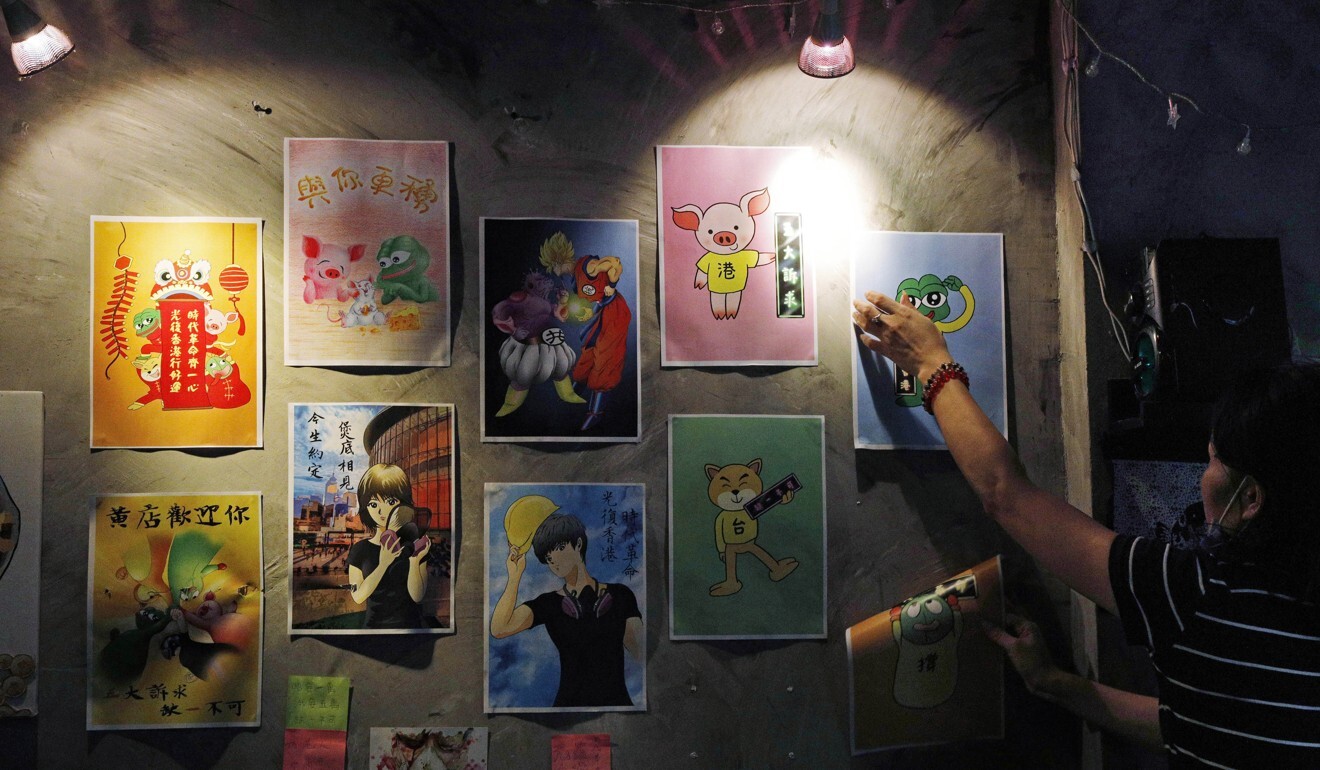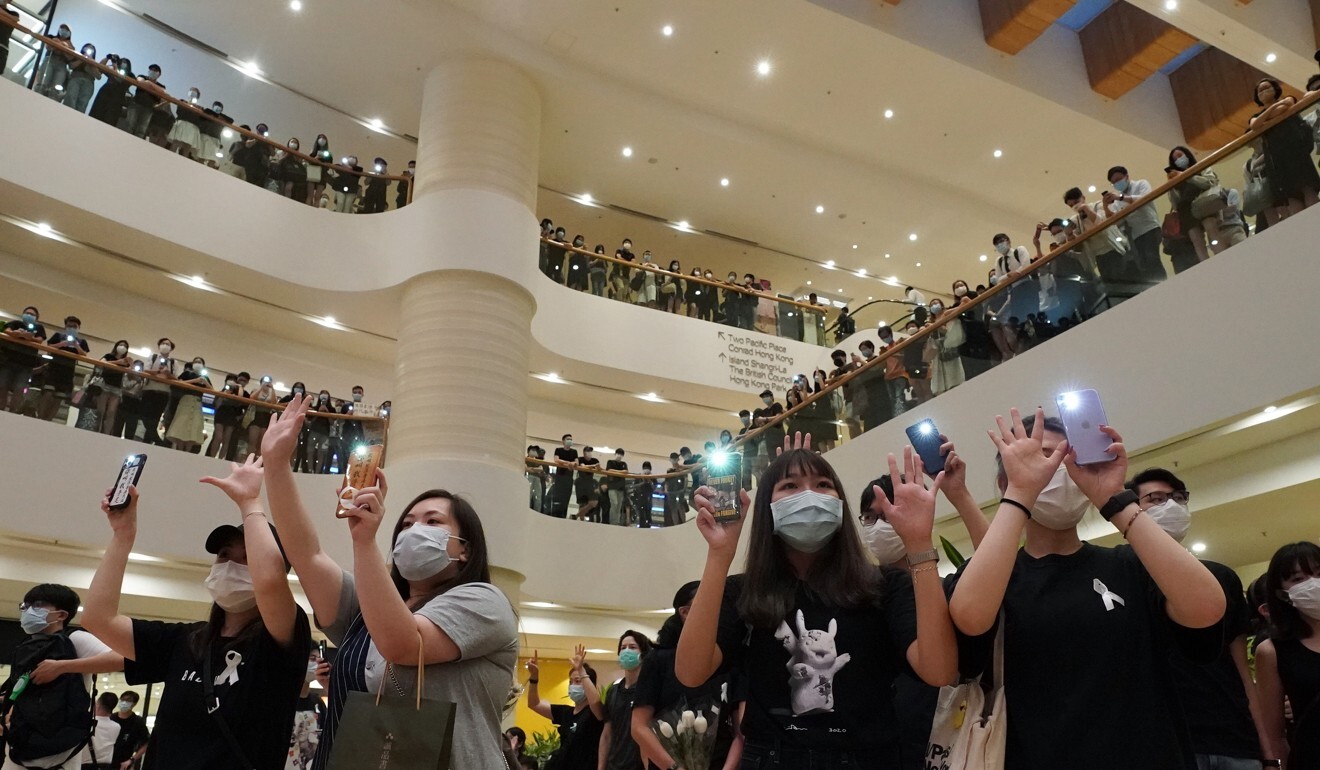
National security law: is chanting ‘Liberate Hong Kong; revolution of our times’ now illegal? City’s lawyers aren’t so sure
- Government’s equating protester slogan with call for independence ‘premature’, as decision lies in hands of the courts, Bar Association chief says
- Legal scholar, pro-establishment heavyweight agree guilt based on chanting alone would be hard to prove
The Hong Kong government’s assertion that popular protest slogan “Liberate Hong Kong; revolution of our times” equates to a separatist call is not a legally binding one, the city’s lawyers said on Friday.
Observers and opposition politicians also cited the government pronouncement as an example of the chilling effect created by the sweeping new national security law, which they said granted authorities an excuse to silence dissidents.
Two days after Beijing imposed its legislation outlawing acts of secession, subversion, terrorism and collusion with foreign forces, the Hong Kong government issued a statement on Thursday defining the familiar slogan of last year’s anti-government protests as an expression of support for independence.
“The slogan … nowadays connotes ‘Hong Kong independence’, or separating the Hong Kong Special Administrative Region from the People’s Republic of China, altering the legal status of the HKSAR, or subverting state power,” the spokesman said in warning people not to break the law.
Hong Kong national security law: What is it about? Read the full text
The statement prompted Hongkongers to come up with creative new ways to express the slogan overnight. Variations included “GFHG, SDGM”, the initials of the chant’s romanised Chinese characters, and “36390242”, which shares a similar pronunciation in Cantonese.
But in an interview with the Post, Bar Association council chairman Philip Dykes said it was “premature” for the government to declare the slogan against the law.
“It is for judges to determine the legal effect of what those words mean,” he said. “It is premature to say that those words … fall foul of the new law.”
Dykes added that only a court could generate a “binding interpretation” of the slogan, or determine the legal consequences for those who chant it.
Hong Kong national security law official English version:
Professor Simon Young, associate dean of the University of Hong Kong’s law school, agreed the government’s statement was non-binding in nature, but said a court might still find the slogan to be “reasonably capable of encouraging acts of secession”.
To convict someone under the new law for inciting secession, Young said it must first be proven they encouraged a second person to commit secession, with the intent that the person go through with the act.
“It may be difficult to prove, but the case would probably also consist of evidence of the person’s previous statements, activities and associations,” he said.
The legal scholar said possessing printed materials alone would be unlikely to lead to a conviction on incitement charges.
It is for judges to determine the legal effect of what those words mean. It is premature to say that those words … fall foul of the new law
“Possessing material with the slogan cannot be an offence of incitement because it has not been shown to anyone and thus no one can be said to have been encouraged,” Young said.
Even pro-establishment heavyweight Maria Tam Wai-chu, vice-chairwoman of the Basic Law Committee, was sceptical, saying the use of the slogan on its own would not automatically fall within the scope of the new law.
“We still have to see if the person who chanted the slogan has participated in other violent acts, or if the person was involved in arranging or organising other actual moves,” she said on a Friday radio programme.
But she reiterated her opposition against the “problematic” slogan.
“The meaning of liberating means that a certain place which belongs to me [was taken away] by some people, maybe unlawfully or by force, or by whatever means … but I’m going to retrieve it,” Tam said. “As far as we are concerned, Hong Kong belongs to China.”
She added that the popular protest song Glory to Hong Kong, which counts “Liberate Hong Kong” and “revolution of our times” among its lyrics, raised similar questions.
Motorcyclist first to be charged under Hong Kong security law
The slogan at the centre of the controversy was first floated by pro-independence activist Edward Leung Tin-kei when he was running in a 2016 Legislative Council by-election.
Leung, then spokesman of Hong Kong Indigenous, once revealed at a rally that he had gone back and forth between “Revolution of the generation” and “Revolution of our times” while crafting the slogan, eventually opting for the latter.
“An era is not categorised by one’s age. Even if you are old, you would belong to a new era as long as you believe in and embrace freedoms. But you would be in the old era if you can’t get rid of the old framework, even if you are very young,” he explained, saying he represented an era of people who were willing to use their “blood and sweat to fight for their freedoms”.

While Leung is still serving a six-year jail term for his role in the 2016 Mong Kok riot, young anti-government protesters in 2019 reintroduced the signature rallying cry at a July 21 anti-extradition bill demonstration and have been spraying-painting and chanting the catchphrase ever since.
In November’s district council elections, electoral officers questioned several election hopefuls over screen grabs of the slogan on their social media accounts, raising fears they would be barred, as have 10 others who advocated independence or self-determination in recent years.
The candidates, after insisting they were not advocating independence, were eventually allowed to contest the elections.
Merkel says Germany worried over ‘erosion’ of Hong Kong’s autonomy
Pro-establishment lawmaker Priscilla Leung Mei-fun, a member of the Basic Law Committee, on Friday renewed her call for those who continue to chant the slogan should be barred from running in September’s Legislative Council elections.
Leung said the government’s statement on Thursday gave clear guidelines to electoral officers.
“If [candidates] continue [chanting the slogan] after the national security law has passed, this will definitely become a reason to disqualify,” she said.
But Civic Party district councillor Leticia Wong Man-huen, one of the candidates quizzed by electoral officers over the slogan last year, insisted it had no separatist leaning.

Wong said she was only hoping to reclaim core values being undermined in Hong Kong when she posted the slogan online, adding the word “revolution” spoke to hopes Beijing would push for political reforms according to the Basic Law.
“It is ridiculous for the government to redraw the red line and try to make prosecutions against expressions and thoughts,” she said.
Wong admitted that deciding if she would still chant the slogan was a struggle.
“We cannot deny the existence of the white terror, and I probably would not chant the slogan loudly in public,” she said.
The government is creating a chilling effect. People can dodge this slogan, but the problem is no one knows how far the arm stretches when the power comes with no restriction
Political scholar Ma Ngok, of the Chinese University of Hong Kong, said the national security law was very vague and far-reaching.
“The government is creating a chilling effect,” he said. “People can dodge this slogan, but the problem is no one knows how far the arm stretches when the power comes with no restriction.”
Council Front lawmaker Eddie Chu Hoi-dick described the government’s statement as “importing speech crime”.
“One one hand we don’t want speech crime, on the other we don’t want to hand them our heads on a silver platter.”
Chu also warned authorities could outlaw other slogans and symbols through the same process. “In the future perhaps even a blank piece of paper could also be problematic,” he said.
Additional reporting by Chan Ho-him



